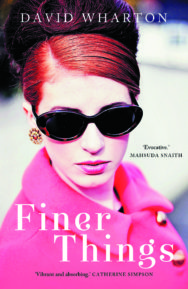‘”I thought you were interesting, that’s all. That is—” There was a liberating, thrilling quality about telling the truth. Careful, she thought, once you start, you might not be able to stop. “You struck me as the sort of person who has secrets.”‘
At BooksfromScotland we love a book with a Sixties setting, and we think David Wharton’s debut, Finer Things, is an excellent portrayal of London in 1963, just as it’s about to start swinging. In the novel, we meet two very different young woman, destined to be friends, Delia, an East End shoplifter, and Tess, a sheltered but curious art student. In this extract, Tess visits Delia for the first time for a portrait sitting.
Extract taken from Finer Things
By David Wharton
Published by Sandstone Press
She had imagined she was getting to know this city. The truth, she realised as she walked alone through Fenfield the following Sunday afternoon, was that she had been confined only to the narrow track between her house in Camden and the Moncourt Institute. For half a year, under the impression she was experiencing London, she had been holidaying in a Butlin’s Bohemia: a world created from ideas – and ideas that were not even indigenous. Its artistic passion and sexual carelessness had been borrowed from Paris, its jazz music and beatnik clothes from New York, its espresso coffee from Rome. All this time, there had been an entirely different London just a few Tube stops away from her house, beyond the walls of the camp.
At least the weather had changed. Almost all the snow was gone: melted away over a couple of days and washed into the drains by a night’s rainfall, so she could see Fenfield uncovered.
The reclaimed marshes that had bequeathed this part of the East End its name were long gone, but there were still horses on the streets. One clopped by her now. The old man leading it wore trousers held up with rope, and beneath his flat cap, rheumy eyes squinted out from a labyrinth of black-grained lines. He might have been ninety. His great grandparents could have seen the eighteenth century; lived during the French Revolution. His grandfathers might have fought in Nelson’s navy. Perhaps his parents had sat in the cheap seats of a theatre and sobbed to hear the deaths of Nancy and Little Nell read by Dickens himself. This old man was a reminder of a city now unimaginable: one that pre-dated these dirty Victorian brick tenements, these rows of doors and stacks of windows.
But here too, more recent history was erasing the deeper past. She walked by a Blitzed-out street where kids played hide and seek in the rubble, undeterred by barbed wire fences and UNEXPLODED BOMB signs. After that, she came across a bank of peculiar, semicircular iron buildings, like giant tin cans half-buried in the ground. She recognised them as Nissen huts, the sort you would find on any army camp. These ones must have been thrown up in the post-war years to provide short-term housing for families displaced by the bombing. Their temporariness forgotten, they had evolved into homes, prettily painted, with tidy gardens. All very nice, Tess thought, but you’d surely freeze in winter; in summer you’d boil; and finding furniture to fit against those curved walls must be impossible.
As she walked past one of these Nissens, a threadbare ginger cat jumped up onto a picket fence and picked its way clumsily beside her, mewing and imploring. It slipped on a white-painted paling and had to scrabble frantically to regain its foothold, so Tess stopped to comfort it. At once, the creature’s character transformed. It hissed and swiped at her. Tiny beads of blood bubbled out of the four long scratches its claws left on the back of her hand.
*
Doddington Road was a couple of streets further on. A long, broad thoroughfare. According to her directions, Tess was looking for the first floor of number 158.
Just shout up at the window, Delia had written. I will hear you. It is always open. So Tess looked up and saw that sure enough there was an open casement.
‘Delia!’ she called, keeping her voice low, not wanting to disturb the neighbourhood. Her nerves were still jangling from the encounter with the woman in the Nissen hut. She felt bourgeois, ill-fitting. When nobody answered, she called a second time, raising her voice to an unexpectedly satisfying bellow.
Delia’s face appeared at a different window, further along the wall. ‘Oh, hello there. I didn’t know if you’d come.’
‘Sorry. I’ve been shouting up at the wrong place.’
‘No, that’s mine all right. I’m in my friend’s flat. She’s doing my make-up. Hold on, I’ll come and let you in.’ Delia vanished inside again. A moment later, someone else stuck her head out of the same window. This must be the friend Delia was visiting: a young woman, blonde, around Tess’s age. Her features were terribly damaged, the bottom jaw misaligned, the left eye almost closed, the nose broken.
‘You the one ‘oo’s painting Dee?’ she said, revealing that several of her front teeth were missing.
‘That’s me.’
‘Nice. Make a better picture than I would, won’t she? Face like mine!’ There was no bitterness in the young woman’s voice, only gloomy acceptance.
‘Actually—’ Tess began. She was about to explain that suffering and loss were the most interesting things to paint, and this ravaged creature would make an excellent subject. But she realised how unkind this sort of truth was, and she stopped herself.
‘Yeah?’ the young woman said.
‘I’m here for Delia today. But I could come back another time.’
The door to 158 opened. The face at the window vanished indoors.
Delia was barefoot, in tight high-waisted grey trousers and a white cotton blouse, like a man’s business shirt cut for a woman’s body. Precise, well-made clothes, incongruous in this rough doorway on this run-down street. Her broken friend had done an excellent job with the make-up too, just enough to sharpen and underline her features. Tess had guessed Delia must make her living from men somehow. Clearly she was doing well out of it.
*
In the living room, Delia sat self-consciously on a battered leather settee. Tess paused from drawing.
‘You don’t need to keep so still, you know.’ She tried to sound like it wasn’t a criticism. ‘It’s not that sort of portrait.’
‘Sorry.’ Delia changed her unnatural pose for another just as bad, then she froze again.
The room was furnished in a jumble of styles – from, Tess assumed, whatever had been around when necessity arose. A ponderous 1930s sideboard stood next to new melamine shelves. The coffee table’s pointed legs and rounded corners had been fashionable ten years previously.
There was one of those spring-loaded ashtrays on an art deco pillar. The sort that looked like a flying saucer. Before now, Tess had only seen them in coffee bars, never in anybody’s house. The green of the linoleum on the floor had faded here and there where the light fell most strongly, and in what appeared to have been the only consciously aesthetic decision anyone had made, the walls had been painted cream, not quite obscuring the wallpaper’s pattern of tiny pink flowers beneath. Shabby as it was, everything looked clean. Delia owned no dust-collecting ornaments, had hung no pictures on the walls. The only remotely personal items Tess could see were a few books on a shelf. As well as the entrance to the flat, there were three other doors: two closed and an open one, through which the kitchen was visible.
‘How long have you been here – in this flat?’ Tess asked.
Delia counted out the time on her fingers. ‘Twelve years.’
‘Is it rented? I rent a room myself. It’s hard to make it personal, I find,’ she said, in a feeble attempt to make some kind of connection. Really, Tess’s study-bedroom was filled everywhere with markers of herself. There were novels she loved; a promotional poster for Lust for Life she’d persuaded the cinema manager in Dewsbury to let her have; picture postcards she had received; bits of her own artwork. The crazy, ancient typewriter.
Delia wasn’t taken in. She remained cagey. ‘This building belongs to my boss – Stella. The rent comes out of my earnings.’
‘I see. I suppose she doesn’t allow you to change too much of it?’
‘She don’t care, long as you don’t burn the place down. A lot of the girls in here’ve made their flats really nice. Me, I don’t like a lot of clutter.’
‘No. I can see that.’
‘You never know when you might have to move on, do you?’
Twelve years of that attitude must feel like a long time, Tess thought. But she’d broken through to something more honest, more personal, so she pursued it. ‘So, Stella owns the shop?’ she said.
Delia looked puzzled, ‘The shop?’
‘Where you work? You mentioned at the Gaudi that you work in a shop.’
‘Yeah, that’s right. Stella owns the shop. It’s a little couturier’s in Chelsea.’
Tess had become something of a liar herself recently. It had given her an ear for it. She put down her pencil and said, ‘Thanks for letting me do this.’
Delia reached down the side of the settee for her handbag and took out a silver cigarette case. Something about the way her manner had changed reminded Tess of the cat that had scratched her earlier.
‘Why are you here, Tess?’
‘You know why. To do some sketches of you for a portrait.’
‘But why a portrait of me? What makes me so special, to bring you all the way out here to the East End?’
‘I thought you were interesting, that’s all. That is—’ There was a liberating, thrilling quality about telling the truth. Careful, she thought, once you start, you might not be able to stop. ‘You struck me as the sort of person who has secrets.’
Delia tapped her cigarette against the flying saucer ashtray. ‘Secrets?’
‘Well, I don’t know what you do, but I don’t believe you work in a shop.’
‘Good,’ Delia said. ‘That’s better than trying to wheedle things out of me all roundabout. If you want to know anything, just ask. Here, let me show you something.’ She crossed to one of the closed doors and opened it. ‘Come and take a look.’
When the house had been carved up into flats, this must have been intended as a bedroom. Delia had turned it into a wardrobe. There were several rows of metal rails, the kind you saw in shops, on which hung uncountable coat hangers bearing dresses, blouses, skirts, jackets and coats. A long theatrical dressing table stood against the far wall with lights around the mirror. On it, Tess saw half a dozen wigs of different colours, four jewellery boxes and a vast array of make-up.
‘It’s only me in the flat,’ Delia said. ‘So I sleep in the box room and I keep all my things in here.’
Tess stepped inside. She didn’t know much about fashion, but she could see how expensive this hoard must be. Time to risk some genuine truth telling, she thought.
‘So you’re a thief, then?’
‘A hoister,’ Delia said.
Finer Things by David Wharton is published by Sandstone Press, priced £7.99
ALSO IN THIS ISSUE

 Finn the Little Seal
Finn the Little Seal
‘The little seal looked at the great waves as they crashed on the rocks. The big sea is far too big …

 Ducks, Newburyport
Ducks, Newburyport
‘The fact that what is it with this constant monologue in my head, the fact that why am I telling my …













